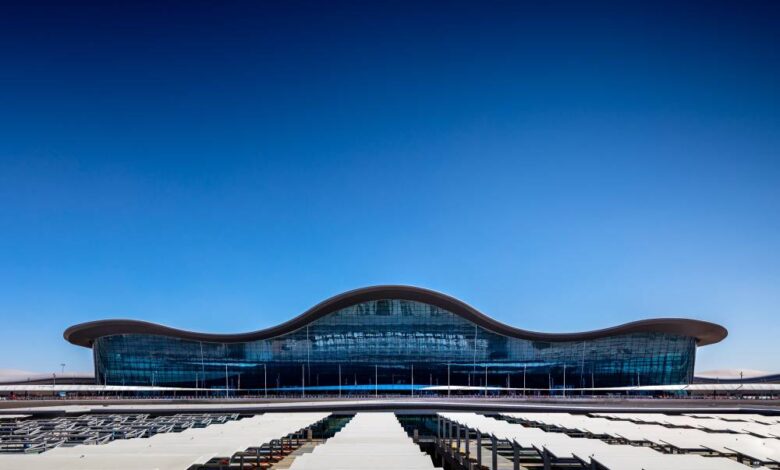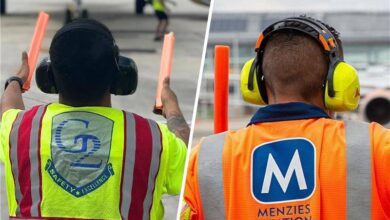“Artificial Intelligence” leads the future of flying in the Emirates

The aviation sector in the UAE is witnessing a qualitative shift driven by artificial intelligence techniques, as national airports and transmission are racing to employ the latest digital solutions in order to enhance operational efficiency, improve passenger experience, and ensure the highest levels of safety and sustainability. From Dubai airports, which has developed an integrated smart system, including the “smart corridor” and high -resolution luggage handling systems, to Zayed Airport, which provides the first “smart travel” experience of its kind globally, through Sharjah Airport, which applies smart solutions to manage passenger flow, confirming the technical infrastructure of these airports are ready for a future that depends completely on automation and data.
On the other hand, Emirati airlines are moving in an accelerated pace towards using artificial intelligence at the various operating stages. UAE and Union Akburn Ends data and technologies to predict breakdowns, improve maintenance and passenger experience. While “Flydubai” and “Air Arabia” depend on flexible smart systems that support future expansion and open the way for more digital transformation.
Dubai airports
Dubai airports continue to employ the latest technologies to enhance operational efficiency throughout all stages of the work, as they have recorded records in the movement of passengers, supported by a modern operational structure, based on the management of vital operations, such as aircraft movement, luggage handling, and transporting travelers. These solutions have contributed to improving passenger flows, accurate prediction of demand, and the use of resources efficiently, within an integrated system that is managed using predictive technologies that follow the movement of aircraft, passengers and weather.
Dubai Airport was one of the first airports in the world to launch the “smart corridor”, which allows travelers to cross the passport point within seconds without the need for documents, through the techniques of recognition of the face, as it is 10 times faster than the current gates.
In terms of logistical operations, Dubai airports launched an advanced system of inventory management, which reduced the surplus, which reflected positively on the speed of implementation of maintenance orders and reduced faults. The luggage system is one of the most prominent areas of excellence at the airport, where the success rate of delivery of luggage is 99.8%, and it is among the highest globally, thanks to smart systems that follow the movement of luggage and reduce errors.
At Al Maktoum International Airport, techniques based on the “travel without contact” experience were introduced, including biometric examination, automation and smart transportation.
Sharjah International Airport
Sharjah Airport relies on modern technologies to enhance its operational efficiency and experience travelers. He applied smart systems to manage passengers and waiters using sensors, in addition to adopting an automatic system to verify climb cards, which contributes to accelerating procedures and improving security. The airport also launched the smart inquiry office, which allows travelers virtual interaction with service employees and obtained customized information. In addition to his support for local innovative initiatives aimed at developing future technical solutions in the aviation sector.
Emirates Airlines
Emirates Airlines depends on artificial intelligence as a pivotal element in its operational strategy. In the technical field, smart monitoring techniques are used to monitor the performance of aircraft engines and predict breakdowns before they happen, which reduces operational costs and enhances weather safety. The company merged advanced data analysis systems, as part of its fleet to accurately monitor performance, and to identify potential breakdowns. Regarding the traveler, the carrier has artificial intelligence to analyze the behavior and preferences of passengers, with the aim of allocating services to them, from entertainment to meals. It also announced the use of modern technologies to predict weather disturbances during flights, in addition to calculating the optimal amount of meals on the planes, based on accurate data about reservation and passenger preferences, which limits food loss and provides millions of dirhams annually. In addition to creating the carrier, a platform for leading research and innovative projects that advise the future of travel, depending on smart solutions.
Etihad Airways
Etihad Airways proceeds to integrate artificial intelligence technologies in its various operations. In the field of air safety, a memorandum of understanding was signed with Mohammed bin Zayed University of Artificial Intelligence in 2023, to develop a operating safety system based on machine learning techniques and smart linguistic models, which provides an accurate and rapid analysis of thousands of operational reports, maintenance records, training activities, with the aim of predicting risks before they occur. It developed a smart analysis platform to collect vital data and compare it with previous operational patterns, which contributed to accelerating the decision -making process and improving risk assessment.
The carrier has developed smart chat robots capable of implementing reservations and providing immediate support to customers within seconds, which improved the quality of interaction with travelers and reduced costs related to traditional support. In the financial field, the Federation adopts advanced systems to monitor any unusual transactions, which enhances the levels of transparency, and reduces the opportunities for manipulation and financial waste. In the context of local empowerment, the carrier trained several trainees within the main departments, which included planning, operations, and human resources. I received Emirati graduates with the aim of preparing them to lead the march of digital transformation in the sector.
Fly Dubai
“Flydubai” is witnessing a development in its operating performance, and this operational boom promoted the presence of a flexible structure and a smart system for managing destinations. Within the framework of its strategy for digital transformation, it began implementing practical steps towards automating its internal operational operations, through the application of biometric gates dedicated to its crews in its sensitive facilities, putting the carrier in an advanced location that qualifies it to adopt artificial intelligence in several vital areas.
Air Arabia
The company’s financial and operational performance reveals a solid digital infrastructure that qualifies it to adopt digital technologies. This performance is attributed to the dependence of the carrier on accurate and effective management systems, allowing it to operate its operations efficiently. Its operational flexibility also shows a future preparation for the adoption of artificial intelligence solutions gradually, whether in the fields of scheduling, smart seat distribution, or improving the traveler’s experience through smart and custom facades.
Zayed International AirportZayed Airport relies on a digital system within the “Smart Travel” project, which has shone in the travel experience by automating all stages of travel, using fingerprint technologies without the need to highlight any documents or wait. The project is the first of its kind in the world in terms of its dependence on the traveler database through the UAE digital identity, which allows them to automatically verify them.
The system allows the traveler to register via electronic gates in just 20 seconds, followed by a passport audit, which does not exceed 7 seconds. It also allows passengers to extract the boarding card through the self -service platforms scattered at the airport, and deliver their own luggage.



